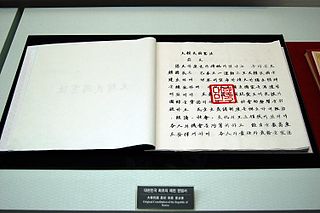
The Judicial Yuan is the judicial branch of the government of Taiwan. It runs a Constitutional Court and oversees all systems of courts of Taiwan, including ordinary courts like the supreme court, high courts, district courts as well as special courts like administrative courts and disciplinary courts. By Taiwanese law, the Judicial Yuan holds the following powers:

The president of Benin is both head of state and head of government in Benin. The Cabinet of Benin is under the authority of the President, and serves to advise and help formulate strategies. It also liaises with ministries and other government institutions.

The Constitution of the Italian Republic was ratified on 22 December 1947 by the Constituent Assembly, with 453 votes in favour and 62 against, before coming into force on 1 January 1948, one century after the previous Constitution of the Kingdom of Italy had been enacted. The text, which has since been amended sixteen times, was promulgated in an extraordinary edition of Gazzetta Ufficiale on 27 December 1947.

The Constitution of the Republic of Korea is the supreme law of South Korea. It was promulgated on July 17, 1948, and last revised on October 29, 1987.

The National Assembly of Armenia, also informally referred to as the Parliament of Armenia is the legislative branch of the government of Armenia.

The Constitution of Kosovo is the supreme law of the Republic of Kosovo, a territory of unresolved political status. Article four of the constitution establishes the rules and separate powers of the three branches of the government. The unicameral Assembly of the Republic exercises the legislative power, the executive branch led by the President and the Prime Minister which are responsible for implementing laws and the judicial system headed by the Supreme Court.

The Constitutional Court of Bosnia and Herzegovina is the interpreter and guardian of the Constitution of Bosnia and Herzegovina, It has the appellate jurisdiction over issues arising out of a judgment of any other court in the country, including the constitutional courts of the two entities and the Court of Bosnia and Herzegovina.

The Constitutional Court of Slovenia is a special court established by the Slovenian Constitution. Since its inception, the Court has been located in the city of Ljubljana. It is the highest court in the country for reviewing the constitutionality and protection of human rights and fundamental freedoms, otherwise the highest court in the country is the Supreme Court of the Republic of Slovenia. The constitutional court is not part of any branch of government and is an independent state body.
The law of the Republic of China as applied in Taiwan, Penghu, Kinmen and Matsu is based on civil law with its origins in the modern Japanese and German legal systems. The main body of laws are codified into the Six Codes:
The Constitution of the Philippines is the constitution or the supreme law of the Republic of the Philippines. Its final draft was completed by the Constitutional Commission on October 12, 1986, and ratified by a nationwide plebiscite on February 2, 1987.

The Constitution of Uzbekistan was adopted on 8 December 1992 on the 11th session of the Supreme Council of Uzbekistan. It replaced the Constitution of the Republic of Uzbekistan of 1978. It is the supreme law of the Republic of Uzbekistan. The Constitution of Uzbekistan contains six parts and it is further divided into 26 chapters.
Part Eighteen of the Constitution of Albania is the last of eighteen parts. Titled Transitory and Final Dispositions, it consists of 8 articles.
Part Three of the Constitution of Albania is the third of eighteen parts. Titled The Assembly, it is divided into 4 chapters that consist of 22 articles.
Part Four of the Constitution of Albania is the fourth of eighteen parts. Titled The President of the Republic, it consists of 9 articles.
Part Six of the Constitution of Albania is the sixth of eighteen parts. Titled Local Government, it consists of 8 articles.
Part Nine of the Constitution of Albania is the ninth of eighteen parts. Titled The Courts, it consists of 22 articles including the Article 144 which was repealed in 2016. Together with Part Eight (Constitutional Court), and Part Ten (The Office of the Prosecutor) underwent radical changes in 2016 during the so-called Justice Reform, which were the efforts of lawmakers to fight corruption, organized crime, nepotism in the justice system.

The Kosovo Judicial Council (KJC) is the national council of the judiciary of Kosovo. It is the oversight body that aims to ensure the independence and impartiality of the judicial system, and the administration of justice in Kosovo.
The Judiciary of Kosovo is the collection of the central Kosovo institutions that exercises judicial authority in Kosovo. According to the 2008 Constitution of Kosovo, the judicial system is composed of the Supreme Court and subordinate courts, a Constitutional Court, and an independent prosecutorial institution. The courts are administered by the Kosovo Judicial Council.
Part Ten of the Constitution of Albania is the tenth of eighteen parts. Titled The Office of the Prosecutor, it consists of 13 articles. Together with Part Eight (Constitutional Court), and Part Nine (The Courts) underwent radical changes in 2016 during the so-called Justice Reform, which were the efforts of lawmakers to fight corruption, organized crime, nepotism in the justice system.

Since the new constitution of Ethiopia enacted in 1995, Ethiopia's legal system consisted of federal law with bicameral legislature. The House of People's Representatives (HoPR) is the lower chamber of bicameral legislature of Federal Parliamentary Assembly with 547 seats and the House of Federation with 108 seats, the former vested on executive power of Prime Minister and the Council of Ministers, and the latter have authority to interpret federal law and oversees regional and federal decisions.











